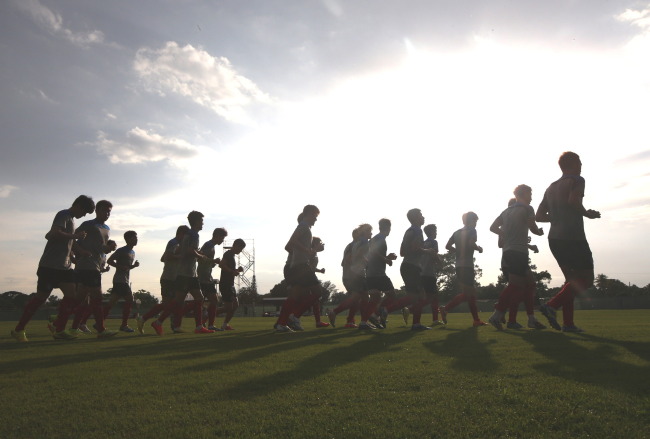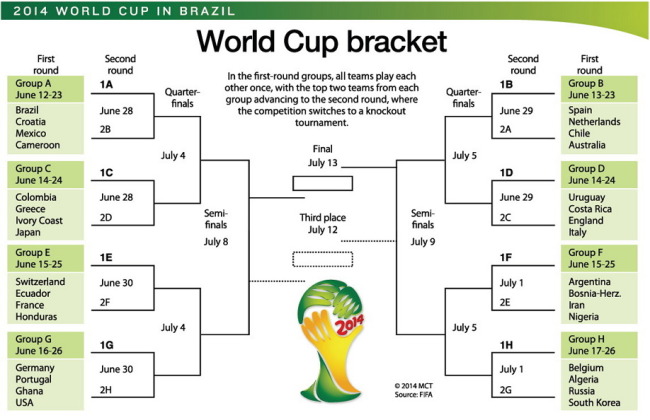As in any sport, the road to victory in football lies just inches away from failure. The elusive victory cigar usually finds its way to someone willing to “fight for that inch,” as Al Pacino put it in “Any Given Sunday,” a sports classic in which he plays a football coach.
But that slim difference between glory and disgrace appeared to have widened to miles, not inches, for the South Korean team on Monday. They were thumped 4-0 by Ghana in Miami, Florida, in their last friendly before the 2014 FIFA World Cup. It was a bitter loss for the Korean side, which aims to reach the quarterfinals for the first time on foreign soil.
The Black Stars from Africa were no pushover. The youngest team in the 2014 World Cup, they were the third from the continent to reach the quarterfinals when they competed in South Africa in 2010. Even so, however, the Taegeuk Warriors not only fell short of a victory but were unable to score a single goal.
“Korea’s offensive players and midfielders were slow on defensive coverage, which piled extra burden on the defenders,” said Kim Dae-gil, a commentator for local channel KBS N. “Their poor conditioning is also a problem, and overcoming this is the key to the team’s success.”
Head coach Hong Myung-bo attempted to downplay the loss, saying his players were under immense pressure and none were 100 percent in shape. However, the shortcomings that were exposed through the match may be difficult to overcome just days before the team’s World Cup kickoff.
One obvious problem was the lack of leadership on the pitch. Whenever the Taegeuk Warriors were in a tight spot, there was no pivotal player to pull them out of crisis. Before the Brazil World Cup, the national team was led by silent-yet-strong captains, from recently retired Park Ji-sung in 2010 to current head coach Hong, who led Korea in its improbable run to the semifinals in 2002.
Strong leadership is nowhere to be found in the current squad. An elder member, Kwak Tae-hwi, is far from being a strong, vocal leader. Neither is striker Park Chu-young. Park, the only team member who will be playing in his third World Cup, registered only two shots in the Ghana match.

The Korean national soccer team trains in Miami, Florida, Sunday. (Yonhap)
The burden of carrying the team fell on the shoulders of 25-year-old Koo Ja-cheol, the youngest captain in the history of the South Korean World Cup squad. He heads the youngest national team ever assembled, but has failed to fill the leadership void.
“I don’t see any player who is able to act as a rallying point for the team. There is also no one to carry out the role of a playmaker in the midfield,” said Kim Ho, a former manager of the national team for the 1994 U.S. World Cup. He pointed out the jerky teamwork and porous defense as potentially fatal weaknesses for a team preparing for its first match in less than a week.
Pressure for victory or blame for a potential loss is piling up on Hong, who has allegedly favored certain players in putting together the 23-man squad. The coach stirred up controversy last month by selecting Park, who was lackluster with Arsenal in the English Premier League and second-division English club Watford in recent years.
Some accused him of favoring “Hong Myung-bo’s kids” in forming his team rather than assembling it fairly. “Hong Myung-bo’s kids” are a group of young players like Park, Koo and Kim Bo-kyung who were regulars in the Under-20 Junior World Cup through to the 2012 Olympics.
The coach must lead his team past the group stage to silence the critics, but the competition in Group H is no picnic. With Belgium emerging as the top favorite, a relatively realistic goal for Koreans would be to overpower Russia and Algeria to secure second place and advance to the 16-team knockout stage.
The key player for South Korea is 21-year-old midfielder Son Heung-min, who plays for Bayer Leverkusen. The versatile youngster is highly regarded in terms of his scoring, speedy rushes and physical endurance. He scored 12 goals in 43 appearances for his professional club.
But the team’s striker position, manned by Park, remains weak, and captain Koo also failed to provide an offensive boost as his shadow striker. Failure to launch menacing or successful shots on net is one of the biggest obstacles the Koreans have to overcome to progress in the tournament.
Right off the bat, Koreans will face their main competitor Russia on June 17. With Belgium widely expected to take the first group match earlier in the day, South Korea must hold steady against the Russians to claim the high ground in the group stages.
As the result of the first game has an impact on later matches, it is critical for the players to get a boost in confidence, with their less-than-satisfactory record of five wins, eight losses and three draws in friendlies prior to the World Cup. Hong’s team must penetrate Fabio Capello’s Russian squad, which prides itself on stifling defense and swift conversion into counterattacks.
The next clash with Algeria on June 22 is a must-win game for Korea, as the North African team is a highly rated underdog, though it has little experience in the World Cup final round. Korea, however, is not in a position to doze off against Africa’s top-ranked team, which has plenty of firepower and ample potential to pull off upsets over higher-ranked teams.
Belgium is not quite in the same league as powerhouses like Brazil, Argentina or Germany, but remains one of the dark horses. That will make South Korea’s June 26 match against Belgium an uphill battle, as their roster is studded with star players. Koreans must watch out for offense led by Chelsea midfielder Eden Hazard while minding the defensive prowess of goalkeeper Thibaut Courtois.
If South Korea advances to the knockout round, it will face one of two survivors from Group G ― either Germany, Portugal, the United States or their recent tormentor Ghana.
By Yoon Min-sik (minsikyoon@heraldcorp.com)








